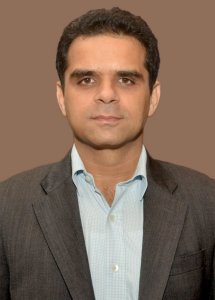- March 31, 2015
- Posted by: kunalsabnis
- Category:BLOG, In Conversation With
 Amit Khurana, CFA is currently working as Head of Equities and Research with Dolat Capital. Dolat Capital is positioned as one of the few mid cap sell side specialist research houses in the institutional segment. Previously, he had assignments with IL&FS (prop book), Birla Sun Life Securities, Collins Stewart and PNB MF.
Amit Khurana, CFA is currently working as Head of Equities and Research with Dolat Capital. Dolat Capital is positioned as one of the few mid cap sell side specialist research houses in the institutional segment. Previously, he had assignments with IL&FS (prop book), Birla Sun Life Securities, Collins Stewart and PNB MF.
How do you view the Equity Broking industry with regards to scope, growth and job prospects? How can CFA charter holders take advantage of it?
The sell side (broking as it is more popularly called in India) has been undergoing a significant transformation of late due to intense competition and rising role of technology in trade execution. Hence the urgent need for various players to define a niche for themselves and invest their time, effort and resources to gain a competitive advantage. I firmly believe that this industry has an important role to play in the growth of the Indian financial market and the benefit of the investors at large.
It will therefore be critical that aspirants for a career in the industry dig themselves deep in any of the areas they are interested – research (sector specialists / market strategists / derivatives), equity sales, and sales traders / back office including risk, compliance and settlement. I believe that the structural demand for each of these shall rise next few years, especially for those with deep domain expertise. The CFA candidates / charterholders are, in my view, amongst the best placed to benefit given the rigour that they go through while writing the exam.
How did CFA help in enhancing your career objectives?
My decision to pursue the CFA program was driven by two factors – first, to deep dive into the domain of research. I was into it during initial few years of my career, however, always felt a gap on depth. The CFA program helped me cover that. Second, I was keen to pursue a program that was amongst the most respected globally. The CFA program is undoubtedly one of the few programs respected in the global investment industry.
How would you rate the CFA course with respect to content and structure including the pros and cons? Also include aspects which give CFA course an edge over other courses.
The content is amongst the best I have come across – depth, global perspectives and covering multiple asset classes. And since it is spread over three years, it is a great test of your perseverance and understanding. All these also give it the unique edge over other programs.
What guidance would you give CFA aspirants?
It’s not a one off exam that you can just get over with in a jiffy! So dig yourself deep and prepare well mentally to go through the rigour over three years. It will test your patience and resolve, however, the end result is worth it. My preference was to start early on readings, and then accelerate midway in the run-up to the exam. Do take multiple, full length practice exams in an exam setting – which means you spend full time grappling with the exam. It really helps you to get that mental strength on the day. All the best!
Points noted above are personal views and not made on behalf of the employer organisation or on behalf of IAIP.
A part of Newsletter – Mar 2015
